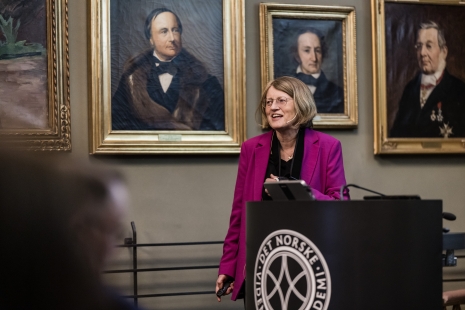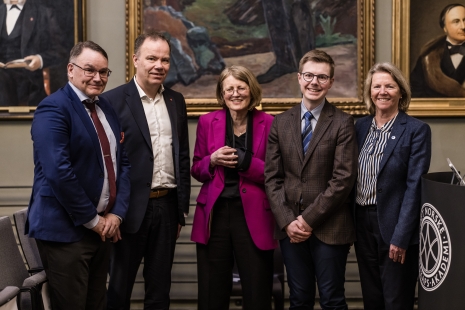
Akademiforelesningen i humaniora og samfunnsvitenskap
2024: Helen Margetts : Artificial intelligence and the changing nature of government
2022: Simon Critchley: Mysticism
2021: Stephen M Gardiner: Defending Climate Justice in a Perfect Moral Storm
2018: Lorraine Daston: Seeing All At Once in Early Modern Science
2017: Nicholas Sims-Williams: From philology to history: Deciphering the language of ancient Afghanistan
2016: Rens Bod: How Interactions between Humanities and Science have Shaped our Knowledge
2015: Raquel Fernández: Women and Culture
2014: Tom Ginsburg: The Virtues of Evolution in an Age of Revolution: Norway's Enduring Constitution in Comparative Perspective
2013: Jürgen Kocka: Limits of Markets and States: Problems in the History of capitalism
2012: Steven Pinker: The history of violence
2010: Yash Ghai: Chimera of constitutionalism: State and society in developing countries
Akademiforelesningen i humaniora og samfunnsvitenskap er en årlig internasjonal forelesning. Den ble for første gang arrangert i mars 2009. I forlengelse blir det annethvert år arrangert et større symposium, det første fant sted i Vitenskapsakademiet i oktober 2009.
Forelesningenen støttes av Grosserer N. A. Stangs legat.
Akademiforelesningen 2024 ble holdt i Akademiet 11. mars.
Professor Helen Margetts vedOxford Internet Institute holdt foredraget The Digital, Data-intensive State: Bringing Data Science and Artificial Intelligence to the heart of government?
About the lecture
This talk examines the changing nature of government in the light of widespread use of data science and artificial intelligence (AI), developing the Digital Era Governance model (Dunleavy and Margetts, 2006, 2013, 2023). Data science and AI offer great potential to improve government, policymaking and public services. These technologies can bring transformative capabilities to government’s information regime, allow the reallocation of state functions, automate tranches of activity and change administrative logics both vertically and horizontally. Government could be more effective, prescient, productive and citizen-centred than ever before. However, as these technologies become embedded across every market and area of society, they also pose new challenges to public safety and democracy itself, particularly in relation to the power of Silicon Valley firms to shape the information landscape. The talk will look at some of the key administrative choices to be made, for example about information regimes, state capacity and organisation, regulation and public-private relationships.
Helen Margetts OBE FBA is Professor of Society and the Internet at the University of Oxford. She is based in the multi-disciplinary department the Oxford Internet Institute, of which she was Director, 2011-8. From 2018, she has also been Director of the Alan Turing Institute’s Public Policy Programme, which develops data science and AI to improve government and policymaking. Before Oxford, she was UCL's first Professor of Political Science & Director of the School of Public Policy (2000-4). She has degrees in Mathematics (BSc), Politics and Public Policy (MSc, LSE) and Government (PhD, LSE).
Her research and writing focuses on the relationship between technology, government, and public policy, including books Political Turbulence (Princeton, which won the Political Studies Association prize for the best politics book, 2017); Digital Era Governance (OUP, 2008); Paradoxes of Modernization (OUP, 2010) and The Tools of Government in the Digital Age (Palgrave, 2007). Prizes and awards include the Technical University of Munich’s Friedrich Schiedel prize (2018) for research and research leadership in social and political science; the OBE for services to Social and Political Science (2019); the Kluge Senior Chair in Technology & Society in the Library of Congress (2019); a Fellow of the British Academy (2019); and the Meyer-Struckmann Prize for Digitization and Democracy research from Heinrich-Heine University, Düsseldorf (2020). She is currently working on two books: How Democracy can Work in a Digital World? and the Third Wave of Digital Era Governance: the Data-intensive Digital State.
